- Home
- Ben Stevens
Confessions of a Japanese Temple Gardener: (P.S – Who's from London, England)
Confessions of a Japanese Temple Gardener: (P.S – Who's from London, England) Read online
春 (Spring)
The Bone Doctor
A Religious Experience…?
Cherry-boy
The Gaijin Monkey Zoo
Road Rage and the Mysterious Case of the Missing Little Finger
Mr. Bear, Cats and Dogs – and Buddha’s Breakfast
A Curse?
夏 (Summer)
Caught by the Fuzz
The Monkey Man and Back at the Doc’s
Ashes to Ashes and Yankee Doodle
Cup o’ Cha
‘A Big Noise… A Big Light…’
Festival of the Dead and Charisma Man
秋 (Autumn)
Pavlov’s Koi
The Typhoon Cometh… and Food Porn
Pig Sick
The Karate Kid
Why Am I Here?
Let’s Get Ready to Rumble
Bamboo Skill
冬 (Winter)
Bird Watching
The Old Man of the Mountain
Priestly Baseball Talk at a Chinese Temple
Fire! Fire!
New Year’s Eve
**************************
春
The Bone Doctor
I bend over to receive a small prick in my backside.
Now there’s something I hoped I’d never have to say – but, well, that’s judo for you.
The mishap occurred just a few days before, at the old dojo (a martial arts’ training hall) that’s situated on top of ‘Daionji’, the 16th century Buddhist temple in Nagasaki where I’m employed as gardener/janitor/general dogsbody.
A burly black-belt named Yamada-san spun in on me to perform some flashy throw…
But instead of his ankle neatly flicking away my right leg – so sending me flying up into the air, to land with a thump and a muffled squawk of surprise on the springy tatami mat – it smacked into my shin and caused me to say a very rude word.
My leg is no better the following day. In fact, I don’t have an ankle anymore. It’s swollen to approximately the same size as the rest of my lower leg, which now has an interesting red, blue, yellow and purple ‘marbled’ appearance.
My toes are also very swollen, like little pork sausages.
Fortunately, it’s my day off from work. So I fill the deep bath with cold water and some ice and keep my damaged leg submerged, in a futile attempt to bring down the swelling.
I hobble around the temple grounds the next day, cutting some bushes and weeding. But by dinner that evening, my wife decrees that I am to see the doctor the following day.
The last time I saw a physician in Japan was when I was sick with some sort of flu/stomach bug. Being a) English and b) stupid, I was quite prepared to tough it out, but at my dear wife’s insistence off we went to the doc’s.
I was coughing quite badly, had a splitting headache and needed to be within sprinting distance of a toilet to evacuate both ends – all symptoms which the grinning male doctor waved away (I really do mean physically, with his hand) when I attempted to explain them.
‘There’s a bug going round,’ he airily informed me. (A salient piece of information, which caused me to wonder how exactly you say ‘No shit, Sherlock!’ in Japanese.) ‘What you need is this medicinal whistle to blow into and this packet of magic beans.’
I’m joking about the magic beans. Well, the packet may very well have contained magic beans but, for reasons I shall shortly come to, I never got the chance to find out.
I’m not joking about the whistle, however. Really I’m not. It was bright red in color, and resembled very slightly an asthmatic’s inhaler.
I’ve no idea in what way it was medicinal, but it did make an amusing ‘whistling’ noise when you blew into it, as Doctor Coco the Clown now proceeded to demonstrate with the ‘model’ he had lying on his desk.
‘In the last week, I must have seen at least fifty patients with the same symptoms as yourself,’ he said, still wearing that disconcerting, ‘Hey, I’m-slightly-nuts!’ grin. ‘In every case, I’ve given them this to blow on!’
It was then I remembered hearing something about how, recently, Japan has been suffering from a lack of cemetery space. Maybe, I conjectured, part of the reason for this was sitting in a white lab coat right in front of me.
We (my wife and I) paid far too much money for this whistle-type thing and packet of magic beans and departed the doctor’s surgery, where people go seeking the proper treatment for things like sore throats and upset stomachs.
‘What did you think of that?’ asked my wife, as we exited into the busy street.
‘Well, I think I could perhaps have received a slightly more thorough examina-…’
It was only then, looking at my wife, that I noticed she was wearing the tight-lipped expression that usually sends me running off to hide behind the nearest solid object.
‘Yes, I think so too,’ she said. ‘Can you wait here a few moments?’
‘Yes, dearest,’ I said timidly.
Taking the packet of magic beans and the whistle, she went back into the doctor’s surgery. She re-emerged minus the beans and whistle, but with the money we had paid for the aforementioned items.
‘I made a complaint about that doctor,’ she said. (Only justified, I thought. Supposing someone did actually go and see him with something potentially serious?) ‘Now we’ll find you another doctor.’
And we did. This time, I was actually asked a number of questions about my symptoms – and had my replies listened to. I even had my chest examined, with a stethoscope! Just like, you know, I was actually seeking proper medical advice or something.
Consultation over, and a bulging paper bag of antibiotics purchased, I went off home to continue my recovery…
…At first, the physician I see for my swollen leg doesn’t fill me with much more confidence than Doctor Clown and his Magic Whistle.
I’ve never been to this particular surgery before. In Japan, if you have (for example) a sore throat, you go to one place; if you’ve injured your hand, you go to another.
In short, it was to a sort of ‘bone doctor’ that I went, now sitting there on a plastic stool while trying desperately to make sense of this grey-haired, male doctor’s mumbling Japanese.
‘Broken ankle,’ he says, sparing my swollen, discolored lower leg a nanosecond-long glance.
Now, I’m no expert – but I can at least still hobble around on my leg. If I had a broken ankle, I don’t think I’d be capable of hobbling anywhere.
I try to transmit this information as politely as possible, although I’m hampered by my distinctly dodgy Japanese. I’ve never studied the language ‘formally’ – just picked up bits and pieces along the way – and, dear me, does it show.
The doctor’s eyes momentarily flash quiet outrage behind his steel-rimmed glasses. This isn’t a country where the judgment of people such as physicians is readily challenged.
But then he softly sucks in some air, prods my affected shin – my leg is up on a small table – and nods solemnly when I give a slight gasp of pain.
‘What happened?’ he asks.
Okay – now we’re getting somewhere! I begin to give a brief explanation of the judo mishap, but then he cuts me off with a (by now familiar) wave of his hand and a nod of his head.
‘Dirty feet,’ he tells me. ‘Dirty feet from the dojo tatami mats. One foot impacted into your shin and has transmitted an infection.’
Well, maybe. I don’t have any open cuts on my leg, however, and anyway – I was wearing full-length white judo dogi trousers at the time.
&n
bsp; Still, the doctor then decides that I should have an X-ray, which, all things considered, sounds like the best possible course of action to me.
We go out into the ‘treatment area’. A middle-aged woman is sat within a sinister-looking metal machine, a series of round ‘weights’ balanced on her head. These weights are supported by a wire tied to a large hook above. The woman is made to sit fully upright by the machine’s high-backed chair.
I assume it’s some sort of treatment for a neck or spinal problem. She sits reading a magazine, just as though she’s in the middle of having her hair done.
X-rays finished, it’s back to the consultation room. The doc gives me the good news as we look at the photos.
‘See this dark matter, lying just under your skin along the affected area?’ he asks, pointing at this ‘dark matter’ with a long thin stick.
‘Seen,’ I confirm.
‘Pus,’ says the doctor. ‘Your lower leg is full of infected pus.’
‘Pus’ is bad enough. ‘Infected pus’ sounds just plain nasty. My mouth falls open in an ‘O’ shape.
‘You need an injection in your backside,’ he informs me.
‘Do I have to?’ I whimper bravely.
The doctor snorts and gives me an ‘Are-you-serious?’ look.
‘If you don’t,’ he tells me, ‘the infection will spread, and the skin of your leg will need to be opened with a scalpel and the infected pus evacuated manually. You will need to go to the main hospital for this, as it is an operation to be carried out under general anesthetic.’
I’m convinced. I lower my trousers and underwear, and receive an injection in one buttock. A small plaster is then affixed.
I thank the doctor, go back out into the ‘treatment’/reception area, and pay the fee. (Health insurance covers a fair chunk of the cost, but it’s up to the patient to pay for the rest – about a third of the total sum.)
I leave the building, passing a bunch of disconsolate-looking men, wearing pajamas and each with a pair of crutches beside them, who are sat smoking by the wheelchair-ramp.
I’m still hobbling, and my leg still hurts like hell (it’s a sort of burning, itching pain now – just in case you were interested), but hopefully the received injection will sort me out shortly.
I’ve no way of knowing that I’ll have to come back here, and soon...
A Religious Experience…?
Many tourists visiting Nagasaki, when they see me working at the temple, quite naturally assume that I’m a Buddhist.
I was even once asked by a middle-aged Australian woman if I was ‘forced to convert’ – as though this was a requirement, having married into a family in which my brother-in-law, Taigi, is a head priest.
In fact, for the first year or so I worked at the temple, my boss Unki-san, the two women who work in the temple office, and the three monks, all vaguely assumed that I was of the Christian faith.
When they discovered that I’m not, they said ‘Oh, right’, and then cared even less.
As you may be beginning to realize, you do not necessarily have to be a Buddhist to work at a Buddhist temple. (I mean in the case of such professions as janitor and gardener – a non-believing priest or monk probably isn’t going to fly.)
This in itself shows just what a genuinely easy-going religion Buddhism is. Would some other religions, I wonder, be quite so tolerant of a non-believer being employed in a designated place of worship?
As a baby I was baptized, attended a Church of England school, and spent my childhood years being taken to church most Sundays. But it wasn’t long before I realized that I didn’t believe in any of it – to put it mildly.
But if I had to choose a religion on pain of death (or just to avoid something rather unpleasant happening), it would be Buddhism. Without a shadow of a doubt.
Which particular branch of Buddhism? Okay, this could get tricky… The temple where I work belongs to the popular ‘Pure Land’ branch of Buddhism, anyway.
Basically (i.e. I’m about to tell you as much as I know myself), a long time ago it was felt by some that Buddhism was starting to become slightly too much of an exclusive club. Only learned men such as monks and priests stood any chance of entering the Buddhist ‘heaven’, following the end of their Earthly existence.
Whereas the average person – particularly those who practiced such reviled professions as tanning and prostitution – stood no chance at all.
The creation of the Pure Land school of thought fixed all of this. From the mighty right down to the meek, whatever their position in society and whatever they did for a living, all a person had to say was the name ‘Amitabha Buddha’ – frequently (the more often they said it the better; one ancient monk said it so often it apparently caused his mouth to shine with a ‘holy light’) and with real ‘feeling’ – and they were all but guaranteed a place in the afterlife.
Or at the very least reincarnation in one of the ‘upper realms’ (i.e. the god realm or the human realm) rather than those decidedly grim ones that can be found near the bottom. (The hungry ghost realm, or just plain old hell.)
Anyway, aside from all that, Buddhism is cool and Eastern and a bit mysterious and very chilled, which is why I’d choose it as my religion any day of the week, should such a thing ever be required…
One of the things my job requires is to set out the temple main hall for services and such, and it’s one of my favorite work activities.
Working on my own putting out chairs and long zabuton cushions, the mokugyo (‘wooden fish’) that are struck with beaters during the service… Incense sticks burning in front of the massive gold statue of Buddha… The pictures and paintings on the walls all around depicting Buddha’s birth, existence and death.
(Caused by eating a plate of dodgy pork, apparently, although Buddha magnanimously forgave the man who made it him before he expired.)
In one corner of the main hall is the large ‘white elephant’ on wheels; or more exactly an elephant-shaped wire frame on a wheeled wooden base, which is covered in white balloons for the procession into central Nagasaki City every year on April 8 – Buddha’s birthday. The white elephant represents the color of the animal that apparently came to Buddha’s future mother in a dream, to inform her that she was in fact pregnant…
Yes, I like working in the main hall very much. Sometimes the late afternoon sun cuts in through the wood and paper windows at just the right angle, and the hall just glows, and all is calm and serene…
But even that cannot match up to what I experience one evening, in the actual ‘living quarters’ of the temple.
In a large room with sliding doors (again made of wood and paper), there is a traditional Buddhist altar with a large metal pot in which sticks of incense are burnt. The pot is full of ash from previously burnt incense sticks.
This altar is in a little alcove of the large room, two thin cushions placed on the tatami mat in front of it.
There is a soft light, and placed on the walls all around pictures of past priests and other notable people from the temple…
There’s a photo of my wife’s late father, upon whose passing my brother-in-law took over as priest, having first to attend a type of Buddhist ‘seminary’ in Tokyo.
There are also photographs of my wife’s grandfather and other relatives, going back to the 19th century.
And there are similarly ancient, creased and black-and-white photos of the temple. In a few some samurai crouch in front of the main hall, swords worn at their sides, stern and unsmiling.
It is in this alcove that incense is lit, a bell struck to produce a long, ringing tone and a small prayer said for the souls of the departed – wherever these souls may be now.
Sometimes I light the incense, as I do this evening; and as it starts to burn and emit its strong-scented smoke, I look at all the photos of people dead and gone and the strangest thing starts to occur…
I become completely, utterly, entirely at peace. Plain old serenity just doesn’t even begin to describe what
I am feeling. It’s a feeling – excuse me, but I’m not the most descriptive of people and I don’t know quite how else to put it – almost orgasmic in its intensity.
Right now, I can perhaps begin to understand why some monks spend their whole lives seeking Nirvana, if this is anything like a taste of it.
My head swims with the… brilliance… of this… feeling…
Then this feeling begins to diminish, slowly but steadily. Wearing off bit-by-bit. I leave the tiny altar room and the burning stick of incense, feeling befuddled and slightly in a daze.
I cannot now recall what the feeling was like, only that it was certainly the most awesome thing I ever felt...
The power of something – that sensation of utter calmness and profound peace…
Where did it come from? I can’t begin to answer that; can’t offer any sort of theory. All I know is that I experienced it while lighting a stick of incense at a Buddhist altar.
So perhaps, even for an unbeliever like me, this could be classified as having been a ‘religious experience’.
Perhaps.
Cherry-boy
My leg’s finally healed well enough for me to be able to return to judo practice. The teacher – Ozaki-sensei, who was once on the Japanese Olympic judo team – tells me to take it easy.
But during the lesson, I’m still paired with ‘Oddjob’, as I call him. (Though certainly not to his face.)
At fifteen years of age, Oddjob is an under-sixteen Kyushu judo champion. (Kyushu is one of Japan’s four main islands, along with Shikoku, Honshu and Hokkaido.) He’s short, extremely stocky, and his ears are already beginning to ‘cauliflower’ from constant judo practice. When he enters the dojo dressed in his neat black school uniform – well, he looks a bit like Oddjob. All that’s missing is the steel-rimmed bowler hat.
I’m thirty-five – exactly twenty years older than Oddjob. So he tries not to give a slight smile of satisfaction, as again and again he easily defeats me with a throw or a hold during our cozy training session together.

 Hostile Genus: An Epic Military Sci-Fi Series (Invasive Species Book 2)
Hostile Genus: An Epic Military Sci-Fi Series (Invasive Species Book 2)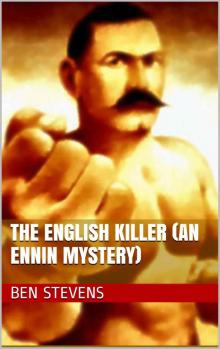 The English Killer (An Ennin Mystery) (The Ennin Mysteries Book 31)
The English Killer (An Ennin Mystery) (The Ennin Mysteries Book 31)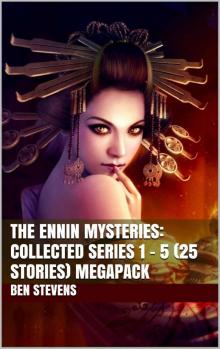 The Ennin Mysteries: Collected Series 1 – 5 (25 Stories) MEGAPACK
The Ennin Mysteries: Collected Series 1 – 5 (25 Stories) MEGAPACK Tokyo Zombie Apocalypse
Tokyo Zombie Apocalypse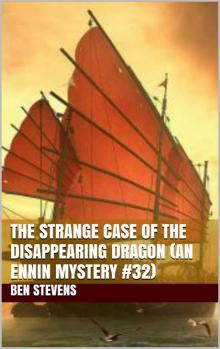 The Strange Case of the Disappearing Dragon (An Ennin Mystery #32)
The Strange Case of the Disappearing Dragon (An Ennin Mystery #32) I, Hell
I, Hell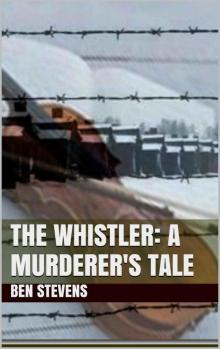 The Whistler: A Murderer's Tale
The Whistler: A Murderer's Tale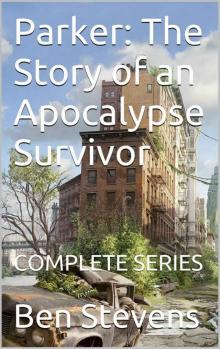 Parker: The Story of an Apocalypse Survivor: COMPLETE SERIES
Parker: The Story of an Apocalypse Survivor: COMPLETE SERIES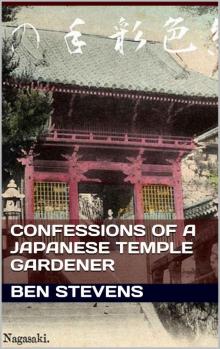 Confessions of a Japanese Temple Gardener: (P.S – Who's from London, England)
Confessions of a Japanese Temple Gardener: (P.S – Who's from London, England)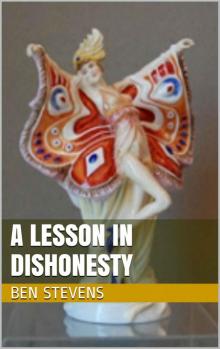 A Lesson in Dishonesty
A Lesson in Dishonesty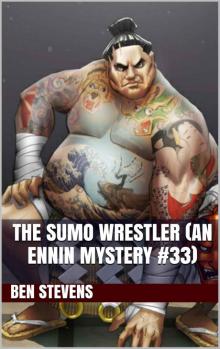 The Sumo Wrestler (An Ennin Mystery #33)
The Sumo Wrestler (An Ennin Mystery #33)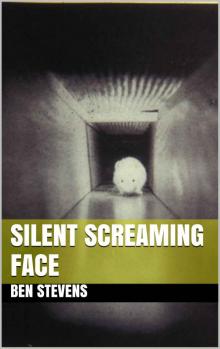 Silent Screaming Face
Silent Screaming Face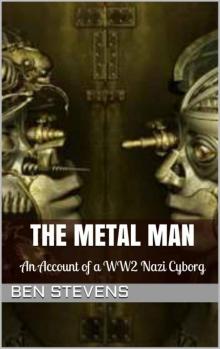 The Metal Man: An Account of a WW2 Nazi Cyborg
The Metal Man: An Account of a WW2 Nazi Cyborg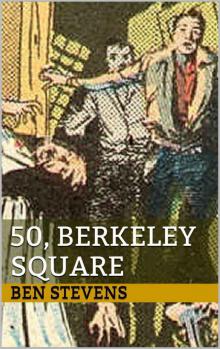 50, Berkeley Square
50, Berkeley Square A Ghost
A Ghost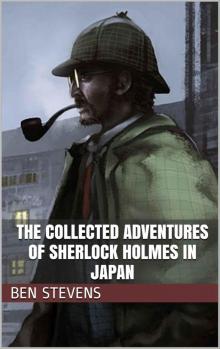 The Collected Adventures of Sherlock Holmes in Japan
The Collected Adventures of Sherlock Holmes in Japan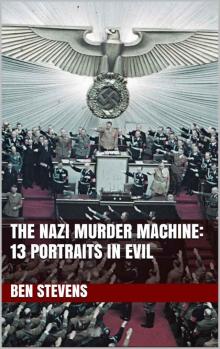 The Nazi Murder Machine: 13 Portraits in Evil
The Nazi Murder Machine: 13 Portraits in Evil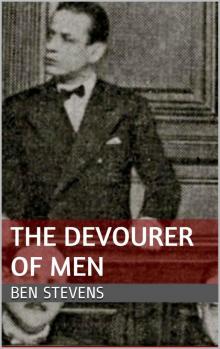 The Devourer of Men
The Devourer of Men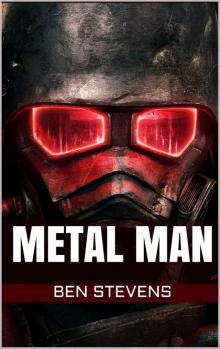 Metal Man
Metal Man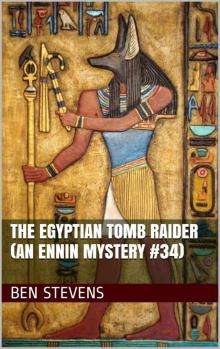 The Egyptian Tomb Raider (An Ennin Mystery #34)
The Egyptian Tomb Raider (An Ennin Mystery #34)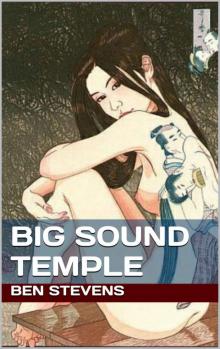 Big Sound Temple
Big Sound Temple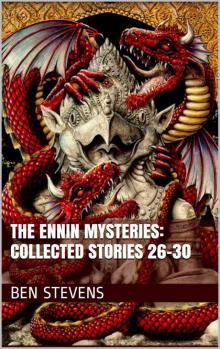 The Ennin Mysteries: Collected Stories 26-30
The Ennin Mysteries: Collected Stories 26-30